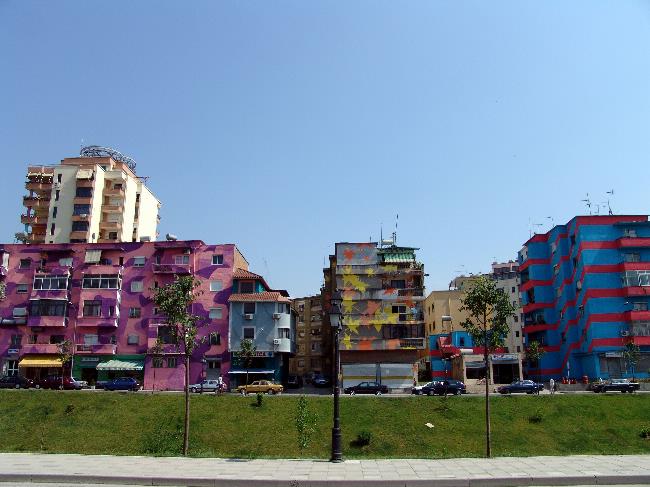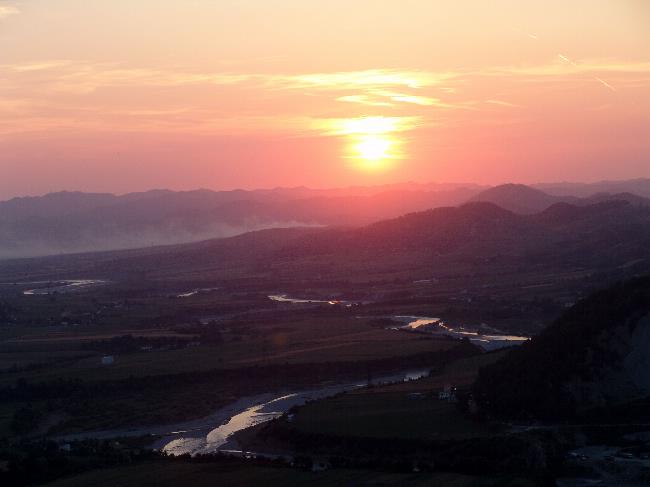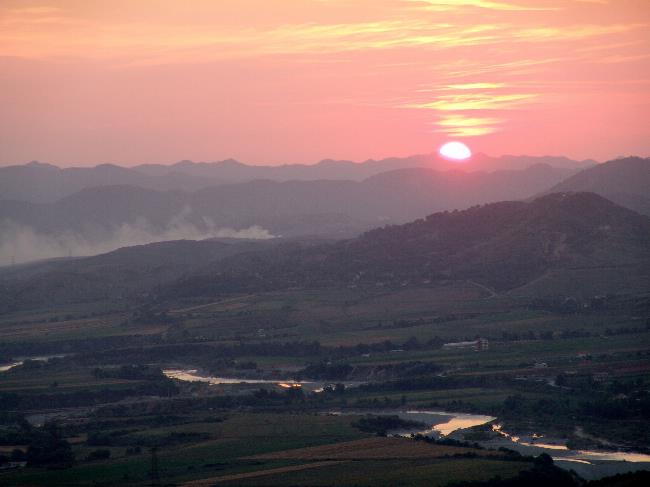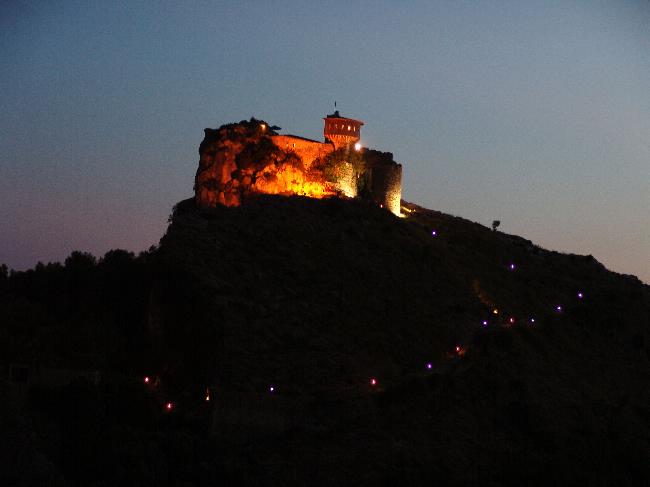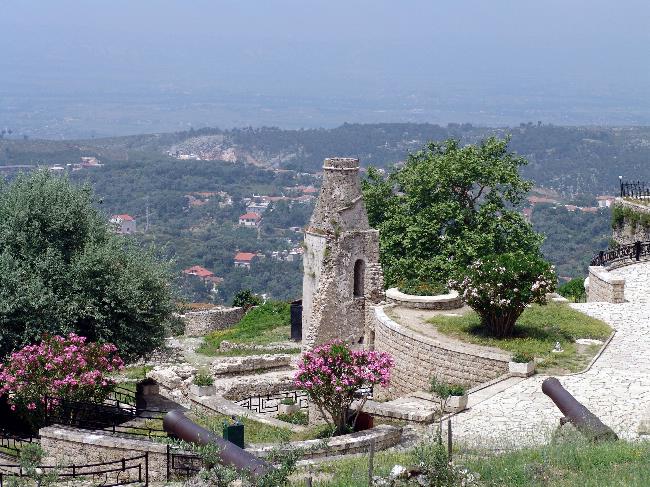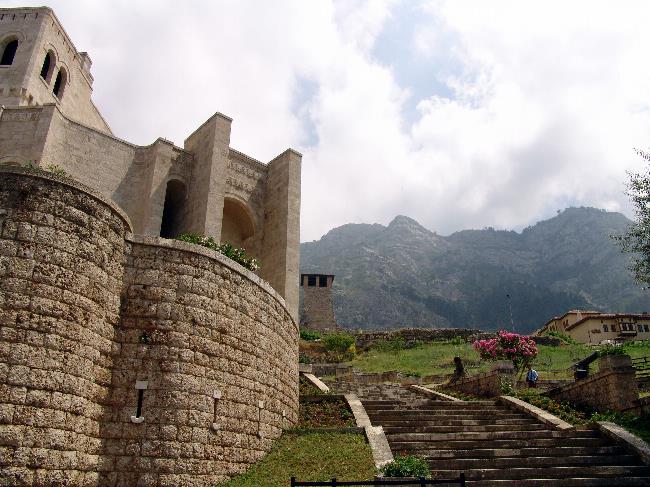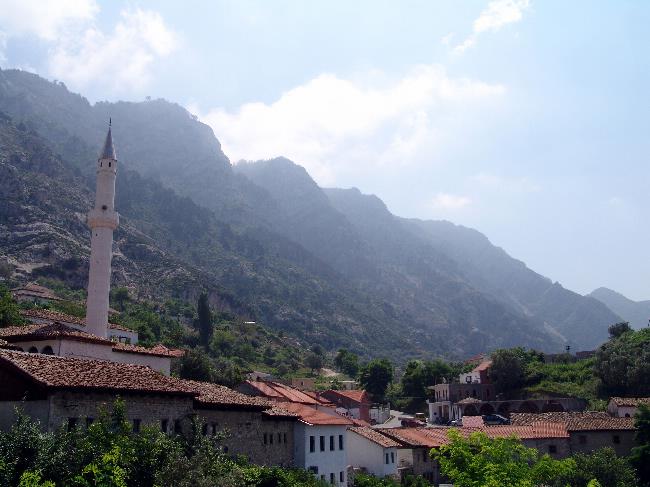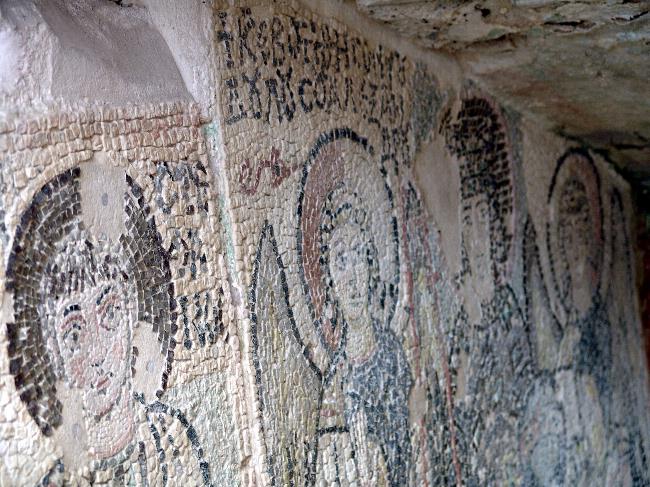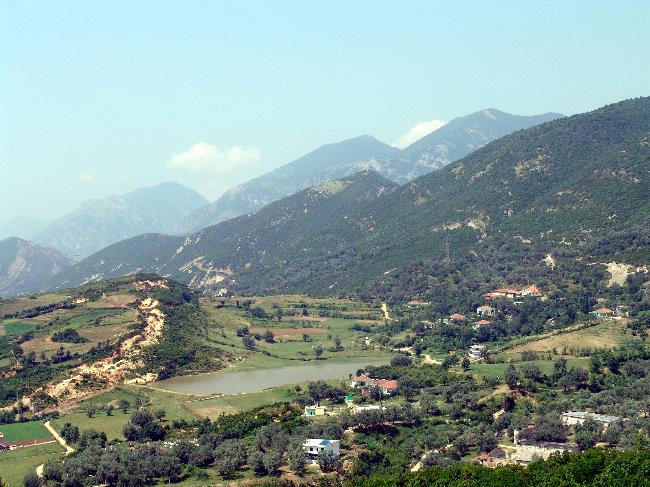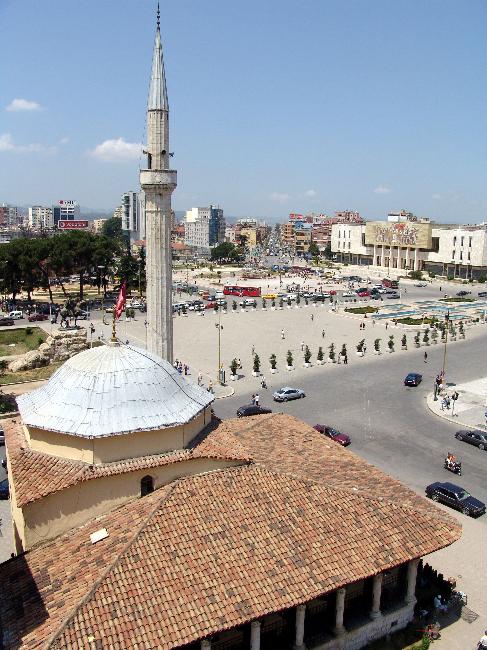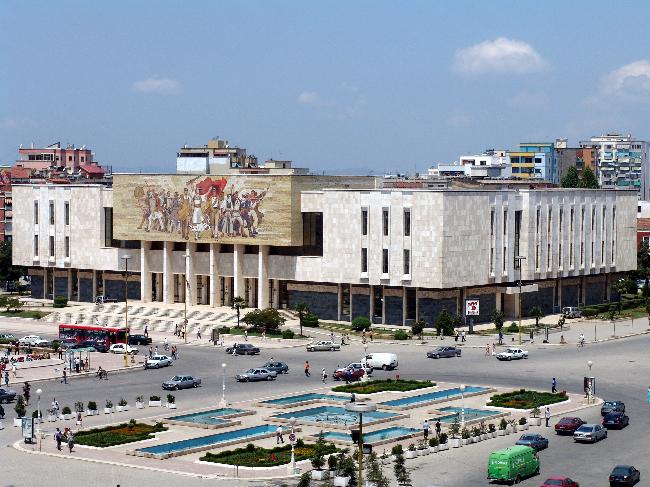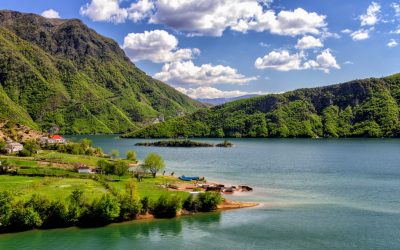Albania
(Republika e Shqipërisë (republic of Albania))

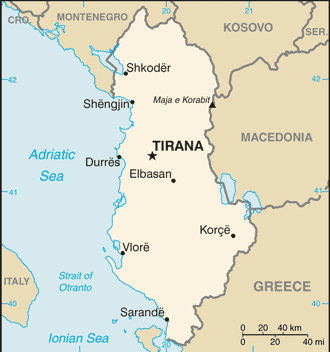
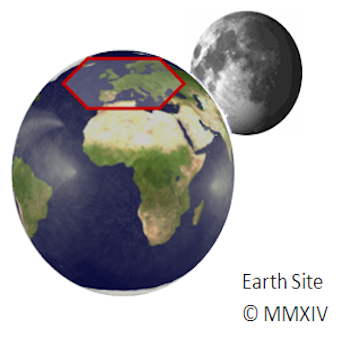
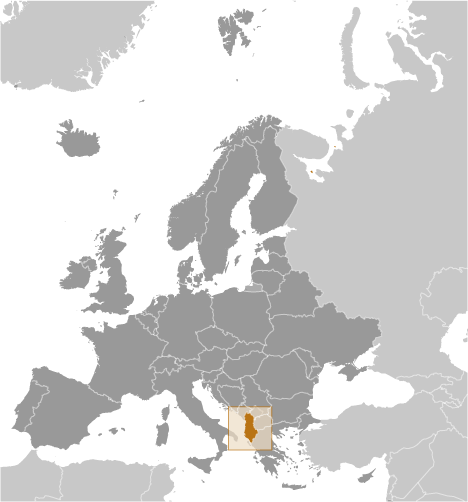
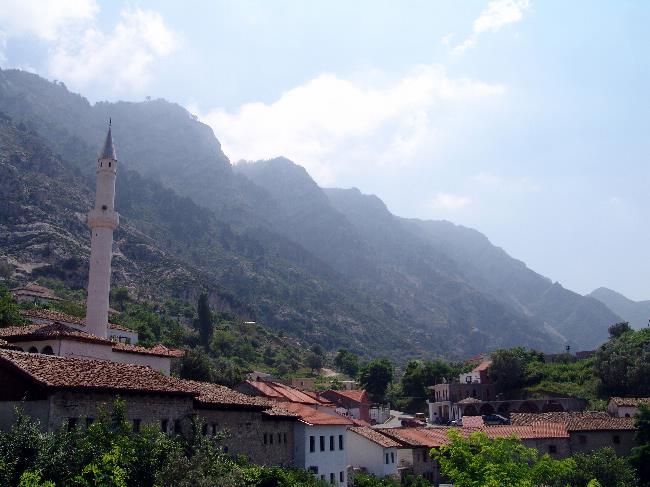
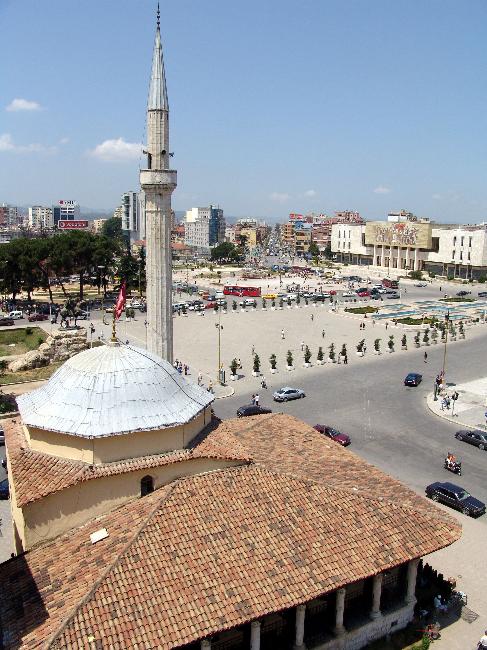
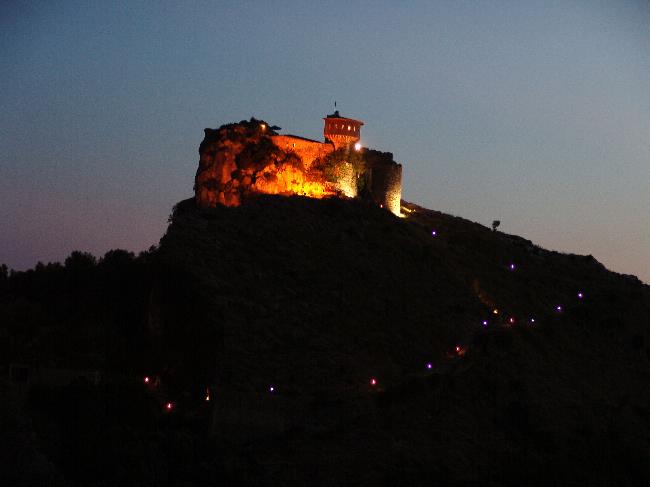
Capital: Tirana (Tiranë)
Population (Estimated July 2012): 3,002,859
Area: 28,748km2 or 11,100mi2
Currency: Lek
Official Language: Albanian
Political Information: Parliamentary Republic
Official Religion: No Official Religion
(but approximately 70% of the population is Muslim, 20% are Albanian Orthodox and 10% are Roman Catholic)
Highest Mountain: Mount Korab (Maja e Korabit (Golem Korab)) at 2,764m or 9,068ft
Largest River: River Drin
GDP Official Exchange Rate (OER is more precise at gauging a countries economic power)
(Estimated 2011): $13.3 billion (US$) or £7,980,000 million(GBP)
GDP (OER) Per Capita (per member of the population estimated 2011): (US$) or (GBP)
GDP Purchasing Power Parity (PPP is good for gauging living conditions and use of resources but not as accurate as OER. This data has been calculated based on the sum value of all goods and services produced in the country valued at prices prevailing in the United States)
(Estimated 2011): $24.99 billion (US$) or £14,994 million(GBP)
GDP (PPP) Per Capita (per member of the population estimated 2011): $7,800 (US$) or £4,680 (GBP)
Time Zone (GMT/UTC): +1:00
Counties/Provinces/States: 37 municipalities (komunat/opstine, singular – komuna/opstina); Decan/Decani, Dragash/Dragas, Ferizaj/Urosevac, Fushe Kosove/Kosovo Polje, Gjakove/Dakovica, Gjilan/Gnjilane, Gllogovc/Glogovac, Gracanice/Gracanica, Hani i Elezit/Deneral Jankovic, Istog/Istok, Junik, Kacanik/Kacanik, Kamenice/Kamenica, Kline/Klina, Kllokot/Klokot, Leposaviq/Leposavic, Lipjan/Lipljan, Malisheve/Malisevo, Mamushe/Mamusa, Mitrovice/Mitrovica, Novoberde/Novo Brdo, Obiliq/Obilic, Partesh/Partes, Peje/Pec, Podujeve/Podujevo, Prishtine/Pristina, Prizren, Rahovec/Orahovac, Ranillug/Ranilug, Shterpce/Strpce, Shtime/Stimlje, Skenderaj/Srbica, Suhareke/Suva Reka, Viti/Vitina, Vushtrri/Vucitrn, Zubin Potok, Zvecan/Zvecan
Sources: CIA World Fact Book, Encyclopaedia Britannica,
Albania, located in Southeastern Europe, is a country with a rich history and vibrant culture. It is bordered by Montenegro to the northwest, Kosovo to the northeast, North Macedonia to the east, Greece to the south, and the Ionian Sea to the southwest. Throughout its history, Albania has been influenced by various civilizations, including the Illyrians, Romans, Byzantines, Ottomans, and Communists. This diverse heritage has shaped Albania into a unique and fascinating destination for travelers.
The cultural heritage of Albania is of great importance to its people. It is a source of pride and identity for Albanians, who have worked hard to preserve and promote their traditions and customs. From traditional folk dances and music to ancient archaeological sites and historical landmarks, Albania offers a wealth of cultural experiences for visitors. The country’s rich history can be seen in its architecture, art, and cuisine, making it a truly captivating destination for those interested in exploring the past.
Geography and Climate: Exploring the Natural Beauty of Albania
Albania is known for its stunning natural beauty, with diverse landscapes that range from rugged mountains to pristine beaches. The country is characterized by its mountainous terrain, with the Albanian Alps in the north and the Pindus Mountains in the south. In between, there are fertile valleys, deep canyons, and crystal-clear lakes. The Albanian Riviera along the Ionian Sea is famous for its picturesque beaches and turquoise waters.
The climate in Albania varies depending on the region. Inland areas have a continental climate with hot summers and cold winters, while coastal areas have a Mediterranean climate with mild winters and hot summers. The country experiences a high level of sunshine throughout the year, making it an ideal destination for outdoor activities such as hiking, swimming, and exploring nature.
Albania’s natural beauty is a major draw for tourists. The country is home to several national parks, including the Albanian Alps National Park, which offers breathtaking views and opportunities for hiking and wildlife spotting. The UNESCO World Heritage Sites of Butrint and Gjirokastër are also popular attractions, showcasing the country’s rich history and architectural heritage. Whether you’re interested in exploring the mountains, relaxing on the beach, or discovering ancient ruins, Albania has something to offer every type of traveler.
Albanian Cuisine: A Delicious Blend of Mediterranean and Balkan Flavours
Albanian cuisine is a delicious blend of Mediterranean and Balkan flavors, with influences from neighboring countries such as Greece, Italy, and Turkey. The cuisine is characterized by its use of fresh ingredients, including locally sourced meats, vegetables, and seafood. Olive oil is a staple in Albanian cooking, along with herbs and spices such as oregano, thyme, and paprika.
Popular Albanian dishes include byrek (a savory pastry filled with cheese or meat), tavë kosi (baked lamb with yogurt), and fërgesë (a dish made with peppers, tomatoes, and cottage cheese). Seafood is also a highlight of Albanian cuisine, with fresh fish and shellfish being widely available along the coast. Traditional desserts include baklava (a sweet pastry made with layers of filo dough and nuts) and trilece (a creamy sponge cake soaked in three types of milk).
Food plays an important role in Albanian culture, with meals often being a time for family and friends to come together. Hospitality is highly valued in Albania, and guests are often treated to generous portions of food and drink. Traditional cooking methods such as grilling over an open fire or baking in a wood-fired oven are still practiced in many rural areas, adding to the authenticity of the cuisine.
Top Tourist Attractions: Must-Visit Places in Albania
Albania is home to a wide range of tourist attractions, from historical landmarks to natural wonders and cultural sites. One of the most popular destinations is the capital city of Tirana, which offers a mix of old and new with its vibrant street art, bustling markets, and historical buildings. The National History Museum and the Bunk’Art museums are must-visit attractions for history buffs.
For those interested in ancient history, the UNESCO World Heritage Sites of Butrint and Apollonia are not to be missed. Butrint is an archaeological site that dates back to the 7th century BC and features ruins from various civilizations, including the Greeks, Romans, Byzantines, and Venetians. Apollonia, located near the town of Fier, was an important city in ancient Illyria and is known for its well-preserved amphitheater and ancient ruins.
Nature lovers will be captivated by the Albanian Alps, which offer breathtaking views and opportunities for hiking, skiing, and mountaineering. The Valbona Valley National Park is a popular destination for outdoor enthusiasts, with its rugged mountains, crystal-clear rivers, and traditional guesthouses. The Albanian Riviera along the Ionian Sea is also a must-visit, with its stunning beaches, charming coastal towns, and vibrant nightlife.
Albanian Traditions and Festivals: Celebrating the Country’s Heritage
Albania has a rich cultural heritage that is celebrated through various traditions and festivals. One of the most important traditions is that of hospitality, with Albanians being known for their warm and welcoming nature. Guests are often treated with great respect and are offered food and drink as a sign of hospitality.
There are also several traditional festivals that take place throughout the year. One of the most popular is the Tirana International Film Festival, which showcases films from around the world and attracts filmmakers and cinema enthusiasts from all over. The Kruja National Folklore Festival is another highlight, featuring traditional music, dance, and costumes from different regions of Albania.
Religious festivals are also an important part of Albanian culture. The Feast of Saint George is celebrated in the town of Kruja, with a procession and various cultural events. The Bektashi Order, a Sufi Muslim sect, celebrates the Day of Ashura with rituals and prayers. These festivals provide an opportunity for Albanians to come together and celebrate their shared heritage.
Language and Religion: Understanding the Diversity of Albania
Albania is a country with linguistic and religious diversity. The official language is Albanian, which is spoken by the majority of the population. There are two main dialects of Albanian: Gheg, spoken in the north, and Tosk, spoken in the south. In addition to Albanian, there are several minority languages spoken in Albania, including Greek, Macedonian, and Serbian.
Religion is also diverse in Albania, with Islam being the largest religion followed by a significant number of Albanians. Christianity is also practiced, with the majority being Orthodox Christians and a smaller number being Catholic. The Bektashi Order, a Sufi Muslim sect, is also present in Albania and has a significant following.
Despite the diversity of languages and religions, Albania is known for its religious tolerance and acceptance. The country has a long history of coexistence between different religious communities, and religious freedom is protected by law. This spirit of tolerance is reflected in Albanian society, where people from different backgrounds live side by side and celebrate each other’s traditions.
Economy and Industry: A Look into Albania’s Growing Business Landscape
Albania has experienced significant economic growth in recent years, with a focus on attracting foreign investment and developing key industries. The country’s economy is based on a mix of agriculture, industry, and services. Agriculture plays an important role in the economy, with products such as wheat, corn, and tobacco being major exports. The industrial sector is also growing, with manufacturing and mining being key contributors to the economy.
Tourism is another important sector in Albania, with the country attracting a growing number of visitors each year. The government has invested in infrastructure and promoted Albania as a tourist destination, leading to an increase in hotel construction and the development of tourist attractions. The tourism industry has created jobs and opportunities for local communities, contributing to the overall economic growth of the country.
However, there are still challenges facing Albania’s business landscape. Corruption and bureaucracy are often cited as obstacles to doing business in the country, and there is a need for further reforms to improve the investment climate. Infrastructure development is also a priority, with investments needed in transportation, energy, and telecommunications to support economic growth.
Education and Healthcare: Advancements and Challenges in Albania
Education and healthcare are important sectors in Albania, with advancements being made in recent years. The government has invested in improving access to education and healthcare services, particularly in rural areas. Efforts have been made to increase enrollment rates in schools and improve the quality of education through curriculum reforms and teacher training programs.
In healthcare, there have been improvements in infrastructure and the availability of medical services. The government has invested in building new hospitals and clinics, as well as upgrading existing facilities. Access to healthcare services has also been improved through the introduction of health insurance schemes and the expansion of primary healthcare centers.
However, there are still challenges facing the education and healthcare sectors in Albania. Funding remains a major issue, with limited resources available for investment in infrastructure and human resources. There is also a need for further reforms to improve the quality of education and healthcare services, particularly in rural areas where access is limited.
Politics and Government: The Current State of Affairs in Albania
Albania is a parliamentary democracy with a multi-party system. The President is the head of state, while the Prime Minister is the head of government. The Parliament is responsible for making laws and overseeing the government’s activities. The country has made significant progress in its democratic transition since the fall of communism in 1991, with regular elections and a free press.
However, there are still challenges facing Albania’s political system. Corruption and organized crime are ongoing issues, with efforts being made to combat these problems through legal reforms and the establishment of anti-corruption institutions. There is also a need for further improvements in the rule of law and judicial independence to ensure a fair and transparent legal system.
The European Union has been an important partner for Albania in its democratic reforms, with the country aspiring to join the EU. The EU has provided financial assistance and technical support to Albania, as well as monitoring progress in key areas such as the rule of law, human rights, and economic development. The government has made efforts to meet the EU’s requirements for membership, but there is still work to be done to address the remaining challenges.
What Makes Albania a Must-Visit Destination?
Albania is a country in the world that remains relatively undiscovered by mass tourism, making it a perfect escape for those seeking authentic experiences. Located in Southeast Europe on the western part of the Balkan Peninsula, Albania is bordered by Montenegro to the north, Kosovo to the northeast, and Greece to the south. The country’s stunning coastline along the Adriatic and Ionian Seas offers pristine beaches, while its rugged, mountainous terrain adds to its dramatic beauty.
A Brief History of Albania: From Ancient Roots to Modern Times
Albania’s history stretches back to ancient times, with influences from the Ancient Greek and Roman civilizations. The Roman conquest of the region brought significant changes to Albania’s culture and infrastructure. Following the collapse of the Roman Empire, Albania became part of the Byzantine Empire, experiencing centuries of power struggles within the Byzantine Empire.
Ottoman Rule and Albania’s Fight for Independence
The Ottoman rule over Albania lasted for nearly five centuries, marked by constant Ottoman invasions. However, Albania’s most famous national hero, Gjergj Kastrioti Skanderbeg, led a fierce resistance against the Ottomans, establishing a short-lived empire that included several Albanian principalities. Finally, in 1912, Albania declared independence from the Ottoman Empire, a pivotal moment in the country’s history.
The Communist Era and the Leadership of Enver Hoxha
After World War II, Albania fell under the leadership of Enver Hoxha, who established the Socialist Republic of Albania. His regime was characterized by strict isolationist policies, cutting off Albania from much of the world. However, since the end of communism, Albania has embraced democratic reforms and opened its doors to the international community.
Albania’s Path to the European Union
Albania’s journey toward European integration has been a key aspect of its modern history. Albania became an official candidate for membership in the European Union in 2009. The country continues to strengthen its ties with its neighbors, including Croatia, and works toward fulfilling the requirements for full EU membership.
The Beauty of the Albanian Riviera
The Albanian Riviera, stretching along the Ionian coast, is renowned for its crystal-clear waters, secluded beaches, and charming villages. With the Adriatic Sea to the north and the Ionian Sea to the south, Albania’s coastline offers stunning views and numerous UNESCO World Heritage sites, such as Butrint.
Tirana: The Heartbeat of Albania
Tirana is the capital and largest city of Albania, serving as the country’s political, economic, and cultural center. Under the leadership of Edi Rama, Tirana has undergone a remarkable transformation, with vibrant public spaces, colourful buildings, and a thriving arts scene. The city perfectly blends Albania’s history and modernity.
Rich Traditions: Religion and Culture in Albania
Religion in Albania is a unique blend of Islamic, Christian, and secular traditions, reflecting the country’s diverse history. The official language spoken in Albania is Albanian. The national dish of Albania, Tavë Kosi, showcases the country’s rich culinary heritage. The Albanian culture is also deeply rooted in music, dance, and folklore.
Fun Facts About Albania and Its People
Did you know that the flag of Albania features a black double-headed eagle on a red background, symbolizing strength and bravery? Many Albanians speak English and Italian, which makes it easy for tourists to communicate. The country’s national symbol, inspired by Gjergj Kastrioti Skanderbeg, is a source of pride for the Albanian people.
Practical Travel Tips for Visiting Albania
If you’re planning to travel around Albania, the best time to visit is during the spring and summer months. The Albanian Riviera is perfect for beach lovers, while the mountainous regions offer excellent hiking opportunities. English speakers will find it relatively easy to navigate the country, especially in major cities like Tirana. Be sure to explore UNESCO World Heritage sites and immerse yourself in the warm hospitality of Albanians.
Future Outlook: Opportunities and Challenges for Albania’s Development
Albania has great potential for future growth and development, but there are also challenges that need to be addressed. The country’s natural beauty and cultural heritage make it an attractive destination for tourism, which can contribute to economic growth and job creation. Investments in infrastructure, education, and healthcare are needed to support sustainable development and improve the quality of life for all Albanians.
There are also opportunities for Albania to further integrate into regional and international markets. The country’s strategic location between Europe and the Balkans makes it an important transit hub for trade and transportation. Efforts are being made to improve connectivity through investments in transportation infrastructure, such as roads, railways, and ports.
However, there are challenges that need to be overcome to ensure inclusive and sustainable development in Albania. Corruption and bureaucracy remain major obstacles to doing business, and further reforms are needed to improve the investment climate. Investments in education and healthcare are also crucial to ensure that all Albanians have access to quality services and opportunities for personal and professional growth.
In conclusion, Albania is a country with a rich history, diverse culture, and stunning natural beauty. From its ancient archaeological sites to its picturesque beaches, there is something for every type of traveler in Albania. The country’s cuisine, traditions, and festivals offer a glimpse into its vibrant culture, while its growing economy and improving infrastructure provide opportunities for development. Despite the challenges that lie ahead, Albania has great potential for a bright future as it continues on its path towards European integration and sustainable growth.
Key Takeaways
-
Albania is a hidden gem in Southeast Europe, offering both coastal beauty and rich history.
-
The Albanian Riviera along the Adriatic and Ionian Seas is perfect for sun-seekers and nature enthusiasts.
-
Tirana is the vibrant capital, shaped by the leadership of Edi Rama.
-
Albania’s history spans ancient roots, Ottoman rule, and the fall of communism.
-
The country became an official candidate for EU membership in 2009.
-
Religion in Albania and Albanian culture highlight the nation’s diversity and resilience.
-
Fun facts about Albania include its striking flag and the widespread use of English and Italian.
-
Prepare for an unforgettable adventure by exploring UNESCO World Heritage sites and embracing the warmth of the Albanian people.
Discovering Albania’s Climate Zones: Regions of Varied Weather
Albania, located in Southeastern Europe, is a country known for its stunning landscapes, rich history, and vibrant culture. One aspect of Albania that often goes unnoticed is its diverse climate zones. Understanding these climate zones is crucial for travel planning, as it allows visitors to make the most of their trip and experience the country’s weather patterns. Albania’s geography plays a significant role in its climate. The country is bordered by the Adriatic and Ionian Seas to the west and has mountainous regions in the north and east. This combination of coastal and mountainous terrain creates a variety of microclimates throughout the country. Summary Albania has seven distinct climate zones, each with its own unique weather patterns and temperatures. The Mediterranean climate zone along the coast is characterized by hot, dry summers and mild winters with occasional rainfall. The continental climate zone in inland areas experiences hot summers and cold winters with snowfall and occasional thunderstorms. The alpine climate zone in high altitude areas has cool summers and cold winters with heavy snowfall and strong winds. The subtropical climate zone in southern Albania has hot, humid summers and mild winters with occasional rainfall. Climate change is affecting Albania’s weather patterns, with increased temperatures and more frequent extreme weather events. The best time to visit Albania depends on which climate zone you want to experience, but generally the summer months are the most popular for tourists. Albania’s diverse weather and climate zones offer a unique and varied experience for visitors to the country. The Mediterranean Climate Zone: Exploring Albania’s Coastal Regions The coastal regions of Albania fall under the Mediterranean...
Exploring Albania’s Political Boundaries: Provinces, Districts, or History?
Albania, located in Southeastern Europe, is a country with a rich history and diverse cultural heritage. Understanding the political boundaries of Albania is crucial for comprehending its political, social, and economic dynamics. This article aims to provide a comprehensive overview of Albania’s political divisions, exploring their historical evolution, the impact of Ottoman rule, the current provinces and districts, the role of politics in shaping these divisions, the cultural significance of regional identities, the challenges of governance, the economic landscape, and the future prospects for Albania’s political boundaries. Summary Albania’s political boundaries have evolved over time, with provinces and districts playing a significant role in shaping the country’s governance structure. Ottoman rule had a profound impact on Albania’s political boundaries, leading to the creation of new administrative units and the consolidation of power in the hands of local elites. Today, Albania is divided into 12 counties and 61 municipalities, each with its own unique political and cultural identity. Politics plays a crucial role in shaping Albania’s provincial and district divisions, with local and national interests often competing for influence and power. Albania’s regional identities are an important part of the country’s cultural heritage, with each province boasting its own distinct traditions, customs, and dialects. The Historical Evolution of Albania’s Provinces and Districts Albania’s historical provinces and districts have undergone significant changes over time. In ancient times, the region was divided into several tribes and city-states. During the medieval period, various kingdoms and principalities emerged, including the Kingdom of Illyria and the Principality of Arbanon. However, with the arrival of foreign powers such as the Byzantines, Venetians, and Ottomans, Albania’s political...
Albania: Economy & Natural Resources Discovering Natural Resources of Albania
Albania: Economy & Natural Resources Discovering Natural Resources of Albania Albania, located in Southeastern Europe, is a country known for its stunning natural beauty and rich biodiversity. With a diverse geography that includes mountains, coastline, lakes, and rivers, Albania is home to a wide range of natural resources. These resources play a crucial role in the country’s economy and provide numerous benefits to both the environment and its people. Preserving and utilizing these resources sustainably is of utmost importance to ensure their long-term viability. By doing so, Albania can continue to benefit from its natural wealth while also protecting the environment for future generations. Albania, a gem tucked away in the Balkans, is more than just beautiful coastlines and ancient ruins. It is a country endowed with natural resources that could transform the economy of Albania. From vast oil and gas deposits to fertile farmland and hydropower capacity, Albania holds the keys to a more prosperous future. In this article, we’ll explore the natural resources of Albania, how they are utilized, and what challenges and opportunities lie ahead. Outline What Are the Key Natural Resources of Albania? How Important Is the Petroleum Sector to Albania? What Role Does Hydropower Play in the Albanian Economy? What Minerals and Ores Are Found in Albania? How Significant Is the Agricultural Sector in Albania? Can Albania’s Natural Gas Reserves Boost Its Energy Security? What Is the Role of Exports in Albania’s Resource Economy? How Has the Albanian Government Managed Its Resource Sector? What Challenges Hamper Albania’s Resource Utilization? What Does the Future Hold for Natural Resources in Albania? What Are the Key...
Exploring Albania’s Varied Terrain: Mountains, Valleys, and Plains
Albania, a small country located in the Balkan Peninsula, is known for its stunning and varied terrain. From majestic mountains to enchanting valleys and lush plains, Albania offers a diverse landscape that is waiting to be explored. This article will provide an in-depth look at Albania’s terrain and the importance of exploring its natural beauty. Summary Albania’s terrain is diverse and varied, with mountains, valleys, and plains. The mountains of Albania are majestic and offer great opportunities for hiking and trekking. The valleys of Albania are enchanting and perfect for exploring on foot. The plains of Albania are lush and ideal for cycling. Albania’s varied terrain also offers opportunities for skiing, snowboarding, rafting, kayaking, and wildlife watching. The Majestic Mountains of Albania Albania is home to several mountain ranges, including the Albanian Alps, the Korab Mountains, and the Ceraunian Mountains. These mountains offer breathtaking views and are popular destinations for hiking and skiing. The Albanian Alps, also known as the Accursed Mountains, are particularly famous for their rugged beauty and challenging hiking trails. With peaks reaching over 2,500 meters, these mountains provide a thrilling adventure for outdoor enthusiasts. For those who prefer winter sports, the Korab Mountains and the Ceraunian Mountains offer excellent skiing opportunities. The Korab Mountains, located on the border between Albania and North Macedonia, are home to Mount Korab, the highest peak in both countries. The Ceraunian Mountains, on the other hand, stretch along the Albanian Riviera and provide stunning views of the Adriatic Sea. The Enchanting Valleys of Albania Albania’s valleys are equally enchanting and offer a unique experience for hikers and explorers. The Valbona...
Discover Albania’s Rich Cultural and Historical Sites
Albania, a small country located in the Balkans, is a hidden gem when it comes to history and culture. With a rich and diverse past, Albania offers a fascinating journey through time, from ancient ruins to Ottoman architecture, from religious diversity to coastal fortresses. This article will take you on a virtual tour of Albania’s cultural treasures, exploring its history, archaeological sites, UNESCO World Heritage Sites, religious sites, coastal fortresses, national museums, traditional crafts, literary legacy, and cultural festivals. Get ready to be amazed by the wonders of Albania! Summary Albania has a rich and fascinating history that spans thousands of years. The country is home to many ancient wonders, including impressive ruins that offer a glimpse into the past. Albania’s Ottoman legacy is still visible today, with many buildings and cultural traditions influenced by the empire. The country boasts several UNESCO World Heritage Sites, which are a testament to its cultural significance. Albania’s religious diversity is reflected in its many sacred sites, which offer a unique insight into the country’s spiritual traditions. Albania’s Fascinating History: A Journey Through Time Albania’s history dates back thousands of years, with evidence of human habitation in the region as early as the Paleolithic era. Throughout its history, Albania has been influenced by various civilizations and empires, including the Illyrians, Romans, Byzantines, Ottomans, and Communists. Each era has left its mark on the country’s culture and heritage. One of the key events in Albania’s history is the Illyrian Kingdom, which existed from the 3rd century BC to the 2nd century AD. The Illyrians were known for their advanced civilization and skilled craftsmanship. The...
Albania’s Population Density: A Closer Look
Population density refers to the number of people living in a specific area, usually measured per square kilometer. It is an important metric that helps us understand how crowded or sparsely populated a region is. In the case of Albania, understanding its population density is crucial for various reasons. It provides insights into the country’s social and economic dynamics, helps in urban planning and resource allocation, and informs policy decisions related to infrastructure development and sustainable growth. Summary Albania has a population density of 105 people per square kilometer. The country’s landscape is characterized by mountains, hills, and coastal plains. Albania’s population density has fluctuated throughout history due to factors such as migration and political changes. Contributing factors to Albania’s population density include urbanization, economic opportunities, and cultural traditions. Albania’s population is predominantly Albanian, with a median age of 32 and a slightly higher percentage of females than males. Understanding the Geographical Landscape of Albania Albania is a small country located in Southeastern Europe, bordered by Montenegro to the northwest, Kosovo to the northeast, North Macedonia to the east, Greece to the south, and the Adriatic and Ionian Seas to the west. It covers an area of approximately 28,748 square kilometers, making it one of the smallest countries in Europe. Albania’s topography is characterized by a diverse landscape that includes mountains, hills, valleys, and coastal plains. The country is home to the Albanian Alps in the north, which are part of the Dinaric Alps range, as well as several other mountain ranges such as the Korab Mountains and the Ceraunian Mountains. The climate in Albania varies from Mediterranean along...
Albania’s Population Density: A Closer Look
Albania, a small country located in Southeastern Europe, has a population density of approximately 105 people per square kilometer. This makes it one of the most densely populated countries in Europe. Understanding population density is crucial for policymakers and planners as it helps them make informed decisions regarding resource allocation, infrastructure development, and urban planning. Population density refers to the number of people living in a specific area, usually measured in terms of persons per square kilometer. It provides insights into the distribution of the population across a country or region. In the case of Albania, its high population density is a result of various factors such as historical trends, migration patterns, regional variations, and urbanization. Summary Albania has a population density of 105 people per square kilometer. Albania’s population growth has fluctuated over the years, with a peak in the 1980s and a decline in recent years. Migration has had a significant impact on Albania’s population density, with many people leaving the country for better economic opportunities. There are significant regional variations in Albania’s population density, with the north being more densely populated than the south. Urbanization has led to an increase in Albania’s population density, with more people moving to cities in search of work and better living conditions. Historical trends in Albania’s population growth Albania has experienced significant population growth over the years. In the early 20th century, the country had a relatively small population of around 800,000 people. However, by the end of the century, the population had more than tripled to over 3 million. This rapid growth can be attributed to several factors. One...
Discovering the Hidden Gems of Albania: A Journey Through the Land of Eagles
Nestled in the Balkan Peninsula, Albania is a country that often goes unnoticed by travelers. However, this hidden gem is a land of rich culture and history, waiting to be explored. With its stunning landscapes, ancient ruins, unique cuisine, and warm hospitality, Albania offers a truly unique travel experience. Albania is located in Southeastern Europe, bordered by Montenegro to the northwest, Kosovo to the northeast, North Macedonia to the east, Greece to the south, and the Ionian Sea to the west. The country has a long and complex history, with influences from the Illyrians, Romans, Byzantines, Ottomans, and Communists. This rich history is reflected in its architecture, traditions, and cultural heritage. What sets Albania apart as a travel destination is its authenticity. Unlike some other European countries that have become overrun with tourists, Albania remains relatively untouched by mass tourism. This means that visitors can experience the country’s natural beauty and cultural treasures in a more intimate and authentic way. From its stunning mountains and pristine beaches to its ancient ruins and vibrant cities, Albania has something for every type of traveler. Key Takeaways Albania is a country with a rich culture and history that is waiting to be explored. The natural wonders of Albania, including its mountains, beaches, and lakes, are breathtaking and worth visiting. Albania is home to ancient ruins and architectural marvels that offer a glimpse into its past. The unique cuisine and local delicacies of Albania are a must-try for any food lover. The warm and welcoming people of Albania make it a great destination for travelers. Uncovering the Natural Wonders of Albania: Mountains, Beaches...
